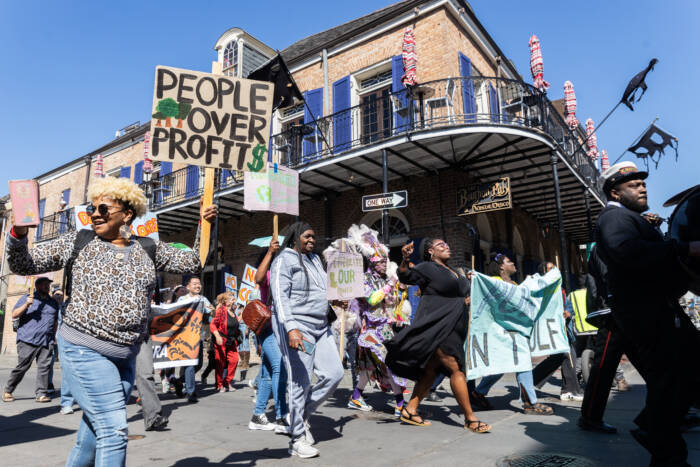By Savio Carvalho, 350.org’s Head of Regions
Savio has worked with human rights, development and campaigning organizations for over two decades and across several countries in four continents. He is responsible for aligning and empowering our local work across the globe. Connect with Savio on X: @savioconnects
2024 was dubbed the “election year,” with nearly 2 billion people across more than 60 countries casting their votes. This wave of elections saw significant gains for the populist right, particularly in Europe and the United States, where frustration with the status quo, economic hardship, and growing inequality drove voters to demand change. Across six European nations, right-wing parties now hold government, with their movements gaining strength in opposition. These results reflect widespread discontent with entrenched disparities and the billionaires who perpetuate them.
The United States, a critical player in global climate politics, is set to inaugurate a Chief Climate Denier in the White House in 2025. This democratic outcome signals a severe setback for the climate movement, with anticipated rollbacks in climate commitments, diminished participation in international agreements, and slowed green investments. This inward-focused agenda threatens to erode collective momentum on the global energy transition, particularly as multilateral processes face growing skepticism worldwide. The precedent set by the U.S. risks emboldening other major emitters to shirk their responsibilities.

Launch of the campaign “The Answer Is Us” in Rio de Janeiro, Brazil, puts world leaders on the spotlight for their climate inaction. Photo credit: APIB
Simultaneously, the geopolitical landscape is becoming increasingly vulnerable to war and conflict, with the 2024 Global Peace Index reporting active conflicts in 92 countries. These internationalized disputes strain an already fragile multilateral system and overstretched humanitarian actors. At the root of many crises lies deepening inequality, with Least Developed Countries (LDCs) and Small Island Developing States (SIDS) trapped between servicing external debt and investing in essential public services. This imbalance reflects the systemic failings of a global financial order that perpetuates inequity rather than addressing it.
Standing at a Historic Crossroads
As ever these challenges present a crossroads, history reminds us of the immense power of hope and collective action. Time and again, seemingly insurmountable obstacles have been overcome by the determination of ordinary people. In 2025, we stand on a precipice, but also at a moment of immense responsibility and possibility.
Nowhere is this more evident than in the fight against climate change. A world without fossil fuels, once unthinkable, is now a goal within reach.
The fossil fuel industry and petro-states continue to profit from extraction, but the tide is turning. Investment in renewable energy and green technologies is accelerating, signaling a shift toward a sustainable future.
However, this “just transition” is far from flawless. To succeed, it must avoid repeating the exploitation of the past. Indigenous peoples and local communities — those most affected by extractive industries — deserve more than tokenistic Free, Prior, and Informed Consent (FPIC). They must be at the heart of decisions about their lands and futures.

Rally in New Orleans, United States, as part of Power Up for Climate Solutions. People demand a just transition which benefits communities over corporate profit. Photo credit: Jordan Daigre
There can be no real justice towards an equitable society if a small group of people, the mega rich, also referred to as “Billionaires” have comfortably used our current economic system (not broken, as it works for them) to amass wealth. Our campaign – Tax their Billions calls on governments to support national and global wealth tax on the mega rich and use the income to pay for renewable energy and a just transition.
Our belief in the power and agency of the people has led us to organize Renew our Power – the first gathering of its kind which brings over 275 community activists, Indigenous leaders and changemakers to unlock and unleash people’s power for change. We will do this by sharing stories, upskilling, organizing and mobilizing for a new phase in the global climate movement.
This year’s critical Climate Change Conference, COP30, will be hosted by Brazil under the leadership of President Lula. Lula has often championed climate action, but a significant gap remains between policy and practice in Brazil. Dubbed the “People’s COP,” this summit offers an opportunity to center grassroots voices, Indigenous leadership, and bold actions that move beyond commitments and rhetoric. If Lula wants to leave a strong legacy, the next few months is the only window left for him to do so. Time is running out.
As we navigate 2025, the stakes could not be higher. Climate change, economic justice, and geopolitical stability hang in the balance. But this is also a pivotal moment—one where people, united by hope and determination, can rewrite the rules. History is watching, it’s time to repower.